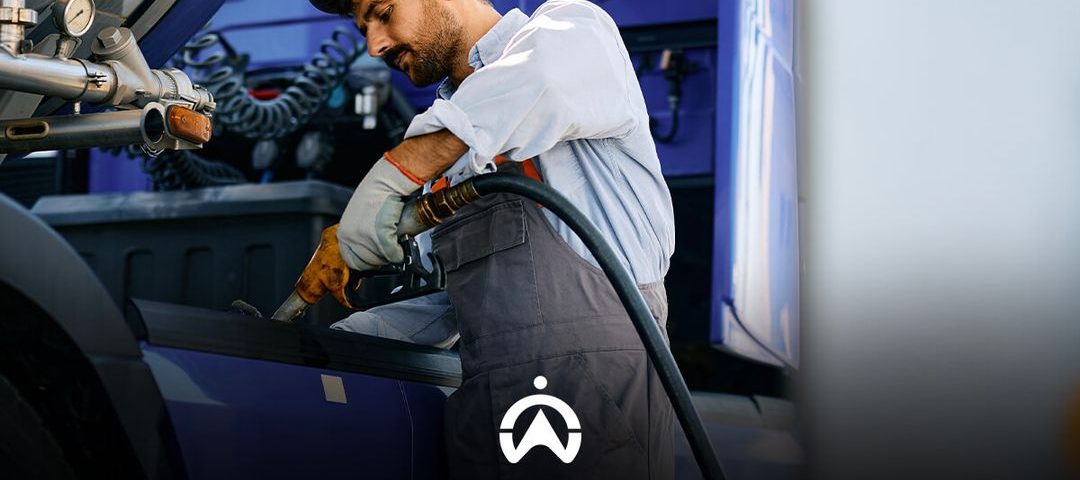10 Reasons Why You Failing at Fuel Management in Your Fleet
Great fleet owners understand that fuel management goes beyond reducing fuel budgets or leaving fuel expenses to employees. Instead, they embrace advanced fuel management to future-proof their businesses for long-term success.
Controlling your fleet’s fuel costs requires fuel monitoring patterns, the right fuel monitoring system, data-driven decisions, and sustainable practices.
If you think you’ve given fuel management your best shot, here are 10 reasons why you may not have mastered fuel management and efficiency just yet.
10 reasons why you failing at fuel management in your fleet
As your business grows, your fleet operating expenses, such as fuel, will most likely increase with it, but this does not automatically result in increasing profits.
If your fleet is still reporting unreasonably high fuel costs that stifle profits, then there may be other factors affecting your fleet fuel management that you need to pay attention to.
Here are 10 reasons why your business may be failing at fuel management and the fuel management solutions you need to know to combat these challenges.
1. Outdated vehicles
It’s not so much old cars versus new cars, but the ongoing vehicle price inflation has made it more difficult for ordinary South Africans and businesses to acquire new vehicles or replace their older and outdated vehicles. Unfortunately, your outdated vehicles may also be the weak point of your fuel management efforts.
- Lower fuel efficiency: Cars become less fuel efficient as they age, meaning you may not get as much mileage from your refuelling and, therefore, need to pour more.
- Increased maintenance needs: Wear and tear over the years also increases your vehicle’s maintenance needs, sometimes including the frequency of fuel system issues.
Alternative Solutions: Transition your fleet
Older in-built technology can make tracking fuel usage difficult. For example, not all vehicles have CANBus technology, which provides more accurate fuel consumption insights.
However, the solution to this weakness is not as simple as just replacing your fleet with the latest vehicle models. Fuel prices are still a major concern for businesses, and fleets that are planning for alternative fuel transition in the next 12 months need to be more strategic to future-proof your business. Consider joining the growing number of fleets, accelerating their EV transition and slowly replacing outdated vehicles with more fuel-efficient ones.
2. Lack of driver training on fuel efficiency
Unnecessary speeding, harsh braking, and excessive idling are fuel-inefficient practices you may be overlooking in your fuel management efforts. An untrained driver is less likely to be aware of how these driving behaviours impact fuel efficiency, so while you are trying to lower your fleet’s fuel costs, these bad driving techniques and habits increase your fleet’s fuel use, causing:
- Increased fuel costs: inefficient driving leads to higher fuel consumption per kilometre, directly increasing a fleet’s fuel expenses and making it harder for you to control your fuel costs.
- Heightened risk of fraud and misuse: your drivers who are not properly trained, poorly disciplined, or uninformed about your fleet’s standard operating procedures (SOPs) may easily misuse your vehicles, causing increased fuel consumption and costs.
Cartrack solution: Fuel efficiency report
Are you aware of how many litres are consumed per kilometre in your vehicle? (This also changes as your vehicle ages). Abnormal fuel efficiency could either indicate fuel theft, high idling, or poor driving habits. Do you know how to calculate the efficiency of each of your vehicles?
Our fuel efficiency report is designed to help you detect fuel inefficiency in your fleet and introduce measures to reduce your fleet’s fuel consumption, especially from untrained fleet drivers, that impact your fleet’s fuel management significantly and reverse all your efforts to reduce your fleet’s fuel consumption and costs.

3. Short trips (stop and start)
The frequent stop-start with short trips causes poor fuel economy in your fleet. When you start your vehicle, it generally requires more fuel than when it runs at a steady speed. According to AA, trips of two kilometres or less use more fuel than longer trips, and based on your vehicle size, short trips could cost you more fuel unnecessarily.
Beyond increasing fuel costs and lowering your fleet’s fuel inefficiency, short trips could be causing your fuel management woes because short trips are:
- Difficult to monitor: Without telematics, fuel monitoring hardware, or a fuel management system, fleet managers find it challenging to track fuel consumption for past trips and optimise fuel usage for short trips.
- More susceptible to fuel theft and fraud: Because it’s difficult to monitor or get detailed fuel usage data with vehicles frequently used for short trips, fuel fraud and theft increase the risk.
Cartrack solution: Live GPS tracking and fleet visibility
GPS telematics helps increase the accuracy of a fuel management system. By tracking the location and activity of your vehicle’s movement, you can mitigate fuel theft risks with short trips by comparing your fleet’s fuel consumption against vehicle mileage and activity.
Cartrack’s route optimisation generates the best order for completing tasks and deliveries, helping you get from point A to B, and finally point C most efficiently by generating your route sequence. This software feature is a smarter way for you to combine multiple planned short trips into one longer journey and reduce the number of harmful stop-and-start trips.
With route optimisation, you can instantly order deliveries and service tasks instead of manually planning your route and work order, which is often less fuel-efficient.
4. Carrying unnecessary weight
There’s a relationship between weight and fuel economy, and you’ll have to pay attention to this in your fleet management. An extra kg of weight can cause the engine to work harder and use more fuel when accelerating and braking.
In addition to lowering your fleet’s fuel efficiency and increasing your fuel costs, carrying unnecessary weight in your fleet can surprisingly cause:
- Accelerated wear and tear: Excessive or frequent additional weight strains your vehicle. Over time, this increases the wear on your vehicle and the risk of mechanical problems.
- Safety risks: Added weight makes it difficult for your drivers to handle your vehicle and compromises vehicle safety.
Cartrack can lighten your load
While the solution seems simple, the less your vehicle weighs, the less fuel it will use. Drivers can avoid carrying unneeded items or extra persons during trips. But the truth is, it’s not only your driver’s additional items (or persons) in the truck that could be slowing down your vehicle or causing fuel management problems. Have you assigned the correct vehicle for the task?
Paying attention to your fleet vehicle capacity helps you ensure that your fuel tank isn’t leaking from unnecessary weight. Cartrack delivery ensures you assign the right vehicle to your drivers for their work and tasks, automatically notifying you when the job might require a larger capacity.
5. Weather conditions
It may be hard to believe, but weather conditions impact your fleet fuel. This is mostly because of how the weather conditions affect your vehicle and the driver’s behaviour. For example, drivers may frequently use the air conditioner on warm summer days which reduces fuel economy by 25%! If you think cutting the AC would work, think again! Driving with the windows down has also proven to affect vehicle aerodynamic drag and increase the need for more fuel.
Colder temperatures also cause higher fuel consumption and difficult driving conditions that force your vehicle’s engine to work harder. Weather conditions affect your fleet in two ways:
- Difficult to mitigate: Weather affects both your drivers’ and vehicles’ performance, and fleet managers can find it challenging to mitigate these effects. How weather conditions affect fuel consumption and activity is often overlooked.
- Not just temperature: Windy conditions and rainy weather can also affect your fleet’s fuel efficiency.
Cartrack Solution: Get strategic about the weather
The weather isn’t something you can dodge or avoid, so it’s up to you to come up with strategies for your fuel management that account for weather conditions. For example, encourage your drivers not to idle to warm up your vehicle and instead drive gently for a few minutes to warm up the engine. Alternatively, as mentioned earlier, you may want to avoid shorter trips on cold days because the vehicle engine may require more time to reach the right temperature.
Track vehicle activity and idling via the Cartrack FleetWeb. Here, you can customise alerts for vehicle idling or download an idling report to get an overview of the frequency of vehicle idling. By knowing which of your vehicles and drivers are idle, you can quickly address this fuel-inefficient behaviour.
6. Bad driving habits
Some driving habits simply waste your fleet’s fuel, so if you want to save on fuel, start by changing and training your drivers to avoid bad driving habits such as speeding, idling, and aggressive driving like harsh braking or accelerating.
Bad driving habits not only reduce your fleet’s fuel efficiency but also put your drivers and vehicles at risk. These common habits cause:
- Increasing full consumption: The costs of bad driving behaviours are estimated to reduce fuel efficiency by 15-30% on the highway and 10-40% on stop-and-go.
- Higher maintenance and repair costs: Reckless driving accelerates the wear and tear on your vehicles and could also result in accidents and damage that is costly to replace or repair.
Cartrack Solution: Monitoring drivers
You can mitigate bad driving habits by monitoring your drivers, identifying these habits, and training your drivers to help them improve. Cartrack’s driver monitoring solutions give insights into your driver’s performance on every trip, which helps you build driver-specific training and coaching.
With Cartrack’s driver scorecards, you can score the frequency of high-risk driver actions like speeding, harsh braking, and sharp cornering and create custom alerts for fuel-wasting bad habits to get notifications if your drivers violate rules.
7. Fuel fraud/theft
Fuel fraud and theft have been a fast-growing problem in South Africa, and more businesses are investing in identifying fuel fraud. Without the right fuel monitoring tools, your attempts at fuel management may be unnoticeable because of internal fraud involving employees and fleet staff.
There are a few ways that fleet staff may be frauding your fleet, including claiming fuel not poured into your vehicles, syphoning fuel from your vehicle’s tank, or engaging in other fuel card fraud. What methods are you using to identify fuel theft in your fleet? Even with fuel cards to monitor your fleet’s staff refuelling expense, there can still be fuel fraud or theft in your company, causing:
- Unnecessary cost to company: Not monitoring and controlling fuel expenses results in excessive costs to the company that could otherwise be avoided.
- Operational disruption: Fuel syphoning and misfueling can cause costly vehicle downtime and affect your fleet’s productivity.
Cartrack Solution: Advanced fuel monitoring
Fuel fraud and theft can cost your business substantially, but without the right fuel monitoring system, it’s very easy for you to miss suspicious activity. Cartrack’s FleetWeb with MiFleet makes it easy for you to monitor fuel theft by sending a notification when there is an increase in fuel consumption and fuel payments that do not align with your vehicle’s mileage.
8. Misuse of fleet vehicles and machinery
Driver deviations, unauthorised activity, or misuse of company vehicles and machinery can each significantly impact your fleet fuel management in several ways, causing serious financial losses. For example, if one of your employees moves your construction equipment to complete personal projects at a different location but leaves the fuel costs up to you, the misuse is costly for you.
Alternatively, your drivers and fleet staff can drain your fuel budget by using vehicles for personal purposes, which results in excessive fuel consumption and high costs. These kinds of unnecessary expenses are delaying your fuel management progress.
Cartrack Solution: Geofence and DID
Cartrack Live GPS tracking and driver identification tools improve your fleet’s fuel management by ensuring that your company vehicles and equipment are not used for personal projects at your expense. Now, you can verify claims for fuel, machinery and vehicle working hours, and other factors by validating where transactions or activities took place and which of your fleet staff were responsible.
9. Poor vehicle/machinery maintenance
Each vehicle and machinery requires specific attention to prolong your fleet’s fuel economy and efficiency. Neglecting maintenance and service tasks like oil changes, air filter replacements, and other engine and tyre checks decreases your fleet’s fuel efficiency.
When you’re managing multiple vehicles and machinery with different ages, performance capacities, and locations, it’s difficult to keep up and arrange maintenance and service tasks for each of your fleets. Overlooking some key maintenance needs in your fleet sets your fuel management efforts back over time by causing:
- Increased fuel consumption: Whether engine problems or issues with the fuel system generally, faulty vehicles in your fleet lead to higher fuel usage.
- Less fuel efficiency: Neglecting maintenance tasks will affect your fleet’s fuel efficiency, making it difficult for your vehicles to perform overtime.
Cartrack Solution: Service Reminders and Preventative Maintenance
Cartrack makes it easy for you to set customisable reminders to help you keep up with your vehicle’s maintenance and service needs. This is one of many handy tools to improve your fleet’s fuel management. In addition to reminders, Cartrack’s FleetWeb platform helps you get proactive about maintenance. Use historical vehicle maintenance and service information on Cartrack’s FleetWeb to predict and plan the maintenance activities your vehicle needs over time.
10. Lack of modern fleet management system or fuel monitoring system
Your fleet and fuel management systems should be equipped with more modern technologies like GPS and telematics for real-time tracking and communication capability. While you think your fuel management strategy is the best, any lack of real-time tracking capabilities makes it more difficult for you to identify the problems affecting your fleet’s fuel.
Using the correct fuel monitoring tools and hardware for the problem you want to address is also important. If you’ve invested in fuel sensors yet continue to struggle with your fleet’s fuel consumption or insights on fleet fuel use, then it is possible that your fleet fuel problems are due to something else. Without the right fuel monitoring system in place, it is difficult to:
- Gain visibility over fuel use: Without the right system, managing and controlling your entire fleet’s fuel consumption becomes more difficult, making it easier for fuel theft or misuse to happen right under your nose.
- Optimise your fleet’s fuel use: Fuel monitoring helps you identify your fleet’s fuel use and gives you insights on adjusting to delivery schedules and minimising fuel inefficiencies.
Cartrack Solution: Advanced fuel management
Upgrading your fleet’s fuel management system is the most effective way to monitor its fuel consumption and expenses closely. Our fuel management system helps you identify and address all fleet behaviours affecting its fuel usage and gives you data-driven insights so you can make decisions quickly.

Why care about your business’s fuel management?
Whether you have a small-scale fleet of 5 vehicles or a larger fleet with over 500 vehicles and specialised machinery, overlooking your business’s fuel management can be costly to your business and its future.
If you haven’t introduced controls for better fuel management yet, here are five reasons why you should care about your business’s fuel management.
1. High fuel prices and fleet budgets
Fuel prices in Namibia are frequently adjusted and impacted by several factors. Not paying attention to your fleet’s fuel consumption also means inaccurate budgeting. Without a well-structured budget and accurate fuel management, it’s difficult for you to properly allocate costs and account for other expenses for your vehicles. A fuel tracking system is one of the most effective ways to track and manage your fuel costs.
2. Manual fuel cost accounting
When you’re looking over and managing diverse fleets of vehicles, including low-powered engine-run machinery, that are perhaps located all over the country and even cross-border, then using manual methods for fuel cost accounting is impractical. Plus, there are plenty of automation tools like fuel cards and fuel monitoring systems that provide more accurate fuel cost accounting.
3. Missing fuel fraud, theft, and other risks
Without proper fuel management, you may be missing or overlooking fraudulent fuel activities that drain your fleet. Fraud risks such as fuel theft, misuse, and fuel card fraud can be prevented with the right fuel monitoring measures.
4. Lack of visibility over vehicle use
Due to a lack of fleet visibility, vehicle misuse and abuse by drivers and other employees can easily go unnoticed. Fuel management helps you detect this misuse and ensures that you avoid the costs of this kind of activity falling on you.
5. Environmental impact of running your fleet
Customers are growing to prefer more sustainable initiatives from businesses. Sustainable fleet transformation often requires businesses to purchase new low-emission vehicles or electric vehicles, but getting ahead of your fuel management is one of the most effective ways to improve the environmental impact of your fleet.
Master Fuel Management with Cartrack Namibia
Cartrack’s Fleet Management System is equipped with everything you need for effective fuel management for your fleet’s success. You’ve got the full guide to fleet management systems. Are you ready to get started with Cartrack?
Contact us for a demo.
Useful FAQs about fuel management
- What are the difficulties in fleet management?
Fuel management is often cited as one of the most difficult challenges for fleets. This is because fuel prices fluctuate constantly, and with every fuel price increase, bad driving habits, and other fleet inefficiency, there is a direct cost to the company.
- What is the major problem facing a fleet company?
Managing high costs is a major challenge for fleet management, as it impacts your business’s ability to compete in the market. For example, if your courier business is forced to increase the cost of service to customers, this may force them to find a cheaper courier company.
- How can I improve my fleet management?
An advanced fleet management system with other integrated technologies like GPS tracking, cost management software, fuel management software, fleet reporting tools, and delivery and task management tools can all help you improve your fleet management.
- How do you manage fuel for the fleet?
This quick step-by-step guide is a starting point for fuel management, but here is a more detailed guide:
Step 1: Gain complete fleet visibility with GPS tracking.
Step 2: Use fuel monitoring systems to monitor and analyse fuel usage.
Step 3: Use route planning and optimisation.
Step 4: Utilise fleet cards to manage refueling.
Step 5: Regularly maintain your fleet.
Get a quick demo of our fuel management system here.




